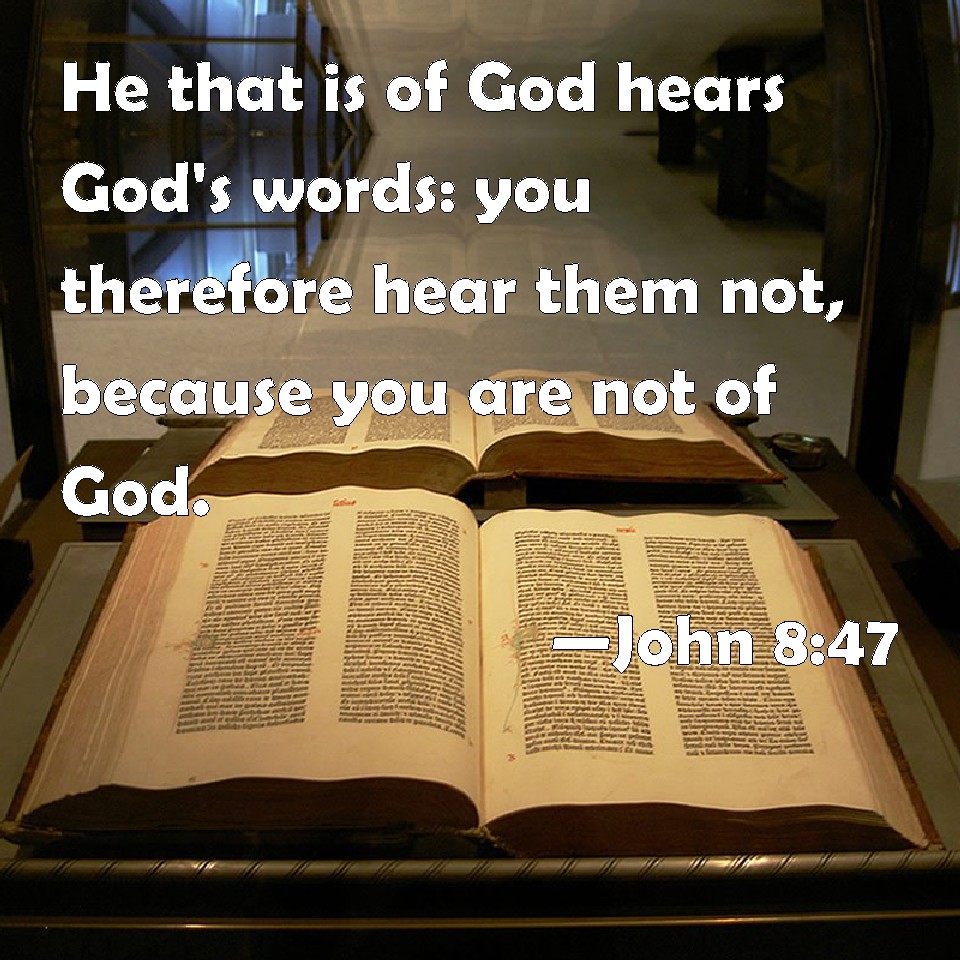Muslims deny that Christ died by crucifixion. They do so in spite of the historical proof of it, attested to by non Christians and atheists. A large portion of Muslims disbelieve this historical fact based upon some statements in the Quran which they interpret to mean that Christ was saved from crucifixion by Allah putting in his place a substitute so that he only "appeared" to have been the one crucified. If this is true, then Allah is the reason why Christians have been duped into believing that Christ was crucified from a false gospel record.
Furthermore, Allah, through Muhammad, told the Christians in his days to judge themselves by the gospel. But, if the gospel had been corrupted prior to the time of Muhammad, then ergo the Christians were being advised by Allah and Muhammad to abide by a false gospel. That is one of the dilemmas of Islam. So we read in the Quran:
"Let the people of the Gospel judge by what Allah has revealed therein. And those who do not judge by what Allah has revealed are ˹truly˺ the rebellious" (Quran 5:47).
How could people of the Gospel judge by the Gospel if it had been corrupted and so much added to it? Also, since Allah promises to preserve his word, whether in the Torah, Gospels, or Quran, how can a Muslim say the Gospel has been altered and changed? The Gospel that was in existence in the days of Muhammad is the same Gospel we have today, and in it the crucifixion is testified to.
Here is the chief text in the Quran that Muslims think denies the crucifixion of Christ.
"They were condemned for breaking their covenant, rejecting Allah’s signs, killing the prophets unjustly, and for saying, “Our hearts are unreceptive!”—it is Allah Who has sealed their hearts for their disbelief, so they do not believe except for a few—and for their denial and outrageous accusation against Mary, and for boasting, “We killed the Messiah, Jesus, son of Mary, the messenger of Allah.” But they neither killed nor crucified him—it was only made to appear so. Even those who argue for this ˹crucifixion˺ are in doubt. They have no knowledge whatsoever—only making assumptions. They certainly did not kill him. Rather, Allah raised him up to Himself. And Allah is Almighty, All-Wise." (Surah 4:155-158; See here)
However, as we will see, this text is capable of being interpreted in a manner where the crucifixion of Christ is not denied. Many Christians who debate Muslims point these things out.
First of all, it seems that the above passage contradicts this passage in the same Quran.
"Lo! God said: "O Jesus! Verily, I shall cause thee to die, and shall exalt thee unto Me, and cleanse thee of [the presence of] those who are bent on denying the truth; and I shall place those who follow thee [far] above those who are bent on denying the truth, unto the Day of Resurrection. In the end, unto Me you all must return, and I shall judge between you with regard to all on which you were wont to differ." (Surah 3: 55; See here)
The apparent conflict arises from the various meanings of the Arabic word mutawaffika in Surah 3:55. This Web Page (here) gives the many different translations of that text. It seems clear to me that the word means just exactly as it is often translated by Muslims themselves, and means "I will cause thee to die."
Further, in the Quran we are given these words that were said to be spoken by Jesus:
"Peace be upon me the day I was born, the day I die, and the day I will be raised back to life!” (Surah 19: 33)
So, the question is not whether Jesus died, but did he die by crucifixion, and if so, why? Christians believe that it was in order that Jesus might die as a sacrifice for sin, and to take the punishment due to sinners. In this way God is just, for transgression must be punished (though Muslims deny this), and also merciful and forgiving, based upon that sacrifice, so that those who receive the sacrifice, atonement, or propitiation, may be saved.
Other Interpretations of Surah 3: 55
Surah 3: 55 is capable of several interpretations and so is not a clear proof that Allah is denying that Jesus was killed by crucifixion. Also, if it means that Jesus did not die by crucifixion, then the Quran contradicts itself and denies what is an historical fact, as we have stated. Here are other possible interpretations:
1) When Allah says "but they (the Jews who boasted that they had killed Jesus and that this proved that he was not the Messiah per the context) neither killed nor crucified him," he may have meant that they did not kill him entirely, for only his body died and not his soul, even as the Quran teaches. Jesus also himself spoke of those who "kill the body but are not able to kill the soul" (Matt. 10: 28).
2) When Allah says "but they neither killed nor crucified him," he may have meant that it was really not the Jews who killed him, but God, for even texts in the Quran uphold this principle. In Surah 8: 17, in commenting upon Muslims who killed unbelievers in battle, Allah says "And you did not kill them, but it was Allah who killed them." So, when Surah 3: 55 says "they neither killed nor crucified him" it could mean that it was God who killed Jesus and that the Jews were merely his instruments. This would be what the Bible itself teaches. Further, as we have seen, Allah in the Quran says "O Jesus! Verily, I shall cause thee to die."
3) When Allah says "but they neither killed nor crucified him," he may have meant just what Jesus meant when he said "Therefore My Father loves Me, because I lay down My life that I may take it again. No one takes it from Me, but I lay it down of Myself. I have power to lay it down, and I have power to take it again. This command I have received from My Father.” (John 10: 17-18 nkjv)
4) When Allah says "but they neither killed nor crucified him," he may have meant that their boast was untrue, that their thinking that their killing Jesus proved that he was not the Messiah was untrue.
5) The text could also mean "they did not kill him" because Allah raised him from the dead, and this is what is meant when the text says "Rather, Allah raised him up to Himself." Raised him from what? Was it not from the dead, and then later from the earth via the ascension into heaven?
There are some good debates on YouTube between Muslims and Christians. The best debaters for Christians, in my opinion, are Sam Shamoun, David Wood, and James White. Here are some introductory videos that are good.
"The Quran DOESN'T Say What Muslims Think It Says!" by David Wood, a man who has had many debates with Muslims and is an expert on the Christian versus Muslim debate. (See here)
"What the Quran REALLY Says about the Gospel" by David Wood (here)
What The Quran Says About the Gospels
Wrote one source (See here)
"The crux of the argument is this: The Quran affirms the inspiration, authority, and preservation of the New Testament Gospels; yet the Quran also contradicts the Gospels on major theological and historical points. Therefore, the Quran cannot be reliable."
"He has sent down upon you, [O Muhammad], the Book in truth, confirming what was before it. And He revealed the Torah and the Gospel." (Quran 3: 3)
Said the source in commentary upon such texts in the Quran:
"These Scriptures from God were available and trustworthy when the Qur’an was revealed in the 7th century A.D., and those who had access to them were repeatedly told to obey them, judge by them, submit to their teaching, and stand fast upon them."
Qur’an 5:47 says, “And let the People of the Gospel judge by what Allah has revealed therein. And whoever does not judge by what Allah has revealed—then it is those who are the defiantly disobedient.”
"Furthermore, Qur’an 5:68 states, “Say, ‘O People of the Scripture, you are [standing] on nothing until you uphold [the law of] the Torah, the Gospel, and what has been revealed to you from your Lord’” (see also 6:114; 3:3-4)."
Under "THE PRESERVATION OF THE GOSPEL" the same source says:
"If the Gospels were trustworthy in the 600s AD, then they are certainly trustworthy today because our extant manuscripts pre-date the Qur’an by centuries. Perhaps even more significant for Muslims is the Qur’an’s statement that no one can change the words of Allah.[3]"
Qur’an 6:115 says, “And the word of your Lord has been fulfilled in truth and in justice. None can alter His words, and He is the Hearing, the Knowing” (see also 18:27)."
The same source makes this commentary on these Quranic texts:
"If the Gospels are the words of God, and no one can change God’s words, then the Gospels must also have been perfectly preserved by God. Otherwise, the Qur’an is wrong."
"Here’s the dilemma for Muslims: If the Gospels are not trustworthy, then the Qur’an is false because it teaches that the Gospels are the inspired, perfectly preserved, authoritative words of God. But if the Gospels are trustworthy, then the Qur’an is false because it teaches contradictory, mutually exclusive facts about key issues. Either way, the Qur’an is false."
"While these verses and others (2:75; 4:46; 5:13; 3:187) do teach that people falsified the Scriptures for money and concealed the truth even though they knew it, there is not a single verse in the Qur’an that teaches the Christian Scriptures have been permanently corrupted, with their message ultimately lost to history."



